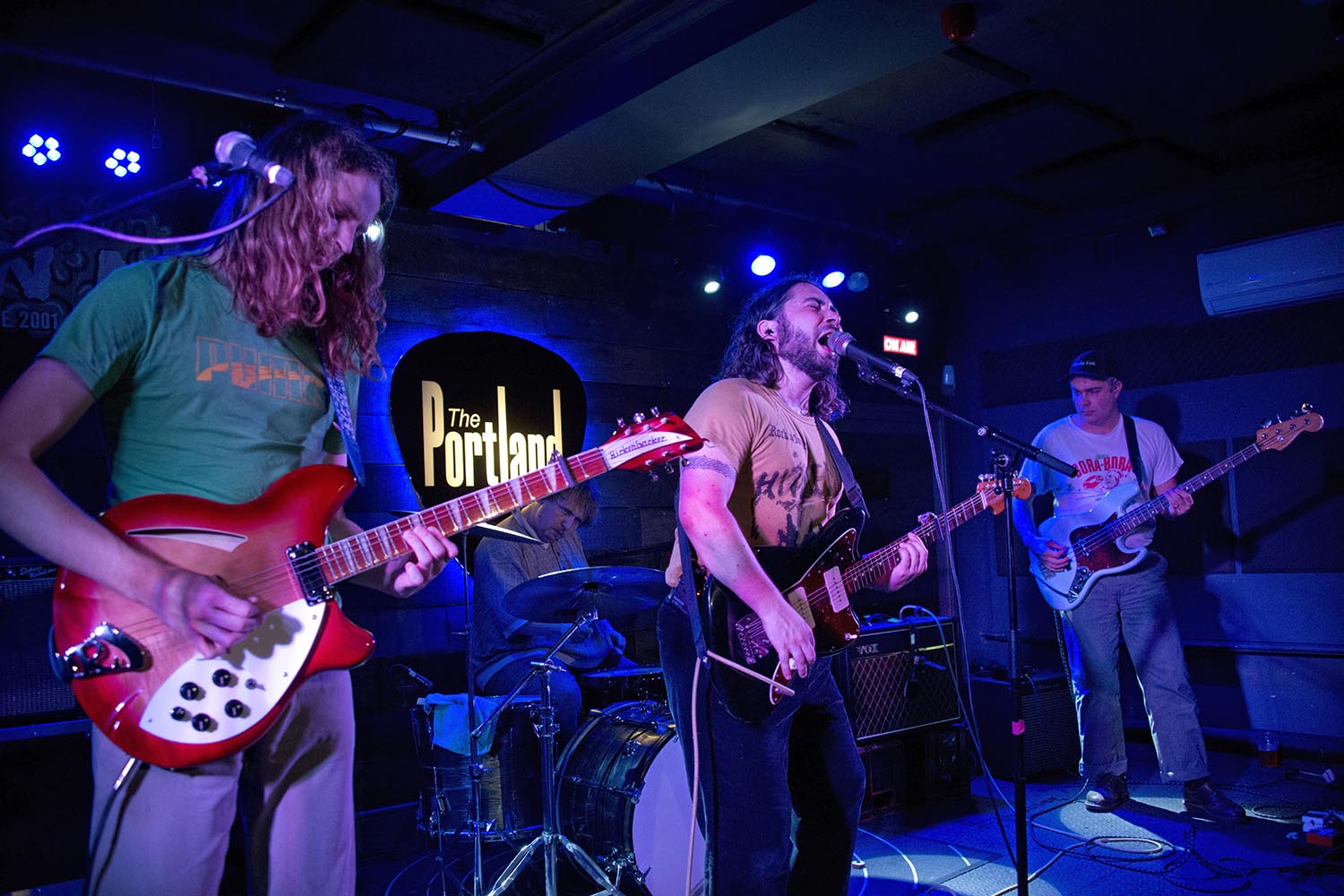The Tubs step on stage in a Cambridge pub, having set up their own equipment, inches from the crowd. They leave it an hour later, making straight for the merch table to sell as many vinyl albums, cassettes and T-shirts as possible. It’s a no-encore, no-frills situation – just a run of 11 exceptional, self-lacerating Tubs tracks set to singalong music that mines post-hardcore, dream pop and folk rock for its essentials, and makes you want to punch the air. This is the antithesis of the arena experience. No Ticketmaster surge pricing; just the whites of the band’s eyes.
It might seem like a terminally first-world problem compared with the burning issues of our time – darling, we’re low on larks’ tongues! – but grassroots music remains in crisis. The horsemen of this apocalypse are familiar, almost boring: the pandemic, Brexit, the soaring cost of living – an omnishambling clusterfuck of forces that drive the closure of small venues and make it increasingly difficult for new acts to become established. And that’s before we consider AI.
It’s expensive for artists to tour, if they selfishly insist upon eating food. Singer-songwriter Kate Nash, a patron of the Music Venues Trust, sells intimate photographs on OnlyFans to fund her own touring. Working-class talent is being priced out of the arts. Recently, Observer columnist Roísín Lanigan made the point that it’s unlikely that a band such as Oasis, whose reunion has been the feelgood rock’n’roll story of 2025, would have made it in the current climate.
Somehow, stubborn, masochistic mavericks survive in the cracks. Heirs to punk’s bare-bones spirit, DIY bands have never been big on fripperies such as managers or food. Welsh rock band the Tubs operate on a shoestring, making brilliant, life-enhancing art without much in the way of a publicity machine or TikTok dances. They are one of the lesser-known feelgood guitar stories of 2025, an indie band for people who thought that indie had nothing of interest left to say.
Their frequent references to independent music’s glory years are a thorough grounding in the classics rather than lazy appropriation
Their frequent references to independent music’s glory years are a thorough grounding in the classics rather than lazy appropriation
The Tubs’ giddily good second album, Cotton Crown, was released in March: a melodic, post-hardcore romp around romance, grief and self-loathing. On the cover is a picture of a woman breastfeeding a baby in a graveyard. The baby is Owen Williams, the Tubs’ singer, who wrote the songs that would become Cotton Crown in the context of many years of grappling with obsessive-compulsive disorder, and at around the 10th anniversary of his mother’s suicide. Thematically, there is a lot to sink your teeth into.
The Tubs’ music, meanwhile, is just as involving. They are, yes, derivative, but their frequent references to independent music’s glory years are a thorough grounding in the classics rather than lazy appropriation.
Johnny Marr’s Smiths-era guitar jangle adorns songs such as Narcissist and Wretched Lie. Minneapolis punks Hüsker Dü were among the first to leaven punk’s fury and pace with melody and hurt in the 1980s, something Nirvana picked up on half a generation later. The Tubs love Hüsker Dü – and Sugar, the band formed afterwards by singer Bob Mould.
Williams grew up in a folk-loving household; his mother was Charlotte Greig, whose 1998 album Night Visiting Songs was rereleased in 2023. As a result, perhaps, Williams is the vocal doppelganger of Richard Thompson, once of Fairport Convention, and another avid chronicler of human foibles.
Mid-set, the Tubs conjure up a beautiful folk-rock coda to One More Day, a song in which Williams begs a lover to grant their relationship a stay of execution. He’s great on how people abase themselves. Sniveller, from the Tubs’ first album, Dead Meat (2023), describes “an arse-licker” wriggling “like a worm” for love. The post-punk guitar work, meanwhile, swaps from needling verses to warm choruses.
The hits keep on coming: Round the Bend is a rousing jam about poor mental health, whose video marks the only time this band has ever had a sniff of a budget. (It stars Mark Proksch, best known for the vampire comedy mockumentary What We Do in the Shadows.)
Newsletters
Choose the newsletters you want to receive
View more
For information about how The Observer protects your data, read our Privacy Policy
At the tail end of the set is the full-pelt Chain Reaction. “I am a scammer in the world of love,” gnashes Williams. “I take it all and I won’t give it.” His songs often caricature his basest moments, he has said in interviews. Williams is the latest in a long line of self-aware antiheroes who persuade you of their charms.
In between songs, the band’s garrulous Scottish drummer, Taylor Stewart, jokingly berates the Cambridge audience’s intelligence and refinement, plays them off against Oxford and Cambridge, Massachusetts, then tells an off-colour joke about a dog. He ends the set begging for anyone who has any of the stomach acid medication omeprazole to leave some at the merch desk.
I give him my Gaviscon.
Photograph by Sophia Evans/The Observer

